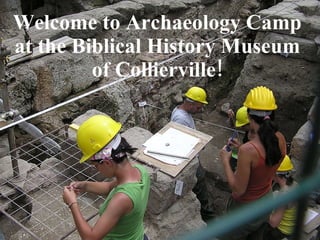Welcome to archaeology camp at the biblical history
•Descargar como PPT, PDF•
1 recomendación•1,063 vistas
Denunciar
Compartir
Denunciar
Compartir

Recomendados
Más contenido relacionado
La actualidad más candente
La actualidad más candente (20)
COMPLETE GUIDE ON WRITING A CASE STUDY ON PREHISTORIC ART

COMPLETE GUIDE ON WRITING A CASE STUDY ON PREHISTORIC ART
Similar a Welcome to archaeology camp at the biblical history
Similar a Welcome to archaeology camp at the biblical history (20)
Definition, Aims, Scope and Relevance of Archaeology

Definition, Aims, Scope and Relevance of Archaeology
Book Review: Archaeology a very short introduction by Paul Bahn

Book Review: Archaeology a very short introduction by Paul Bahn
Welcome to archaeology camp at the biblical history
- 1. Welcome to Archaeology Camp at the Biblical History Museum of Collierville!
- 3. A Day In the Life Introductory Videos about Archaeology
- 5. Excavators + excavation = A field Crew Artifacts + analysis = Collections specialist Animals + archeology = Zooarcheologist Scuba diving + archeology = Underwater archeologist Nature + archeology = Environmental archeologist History + archeology = Historical archeologist Geology + archeology = Geoarcheologist Talking + listening = Oral historian
- 9. First: Indentify your site Next: Select your site crew and excavation crew Then: Be sure to plan ahead and have all materials ready for excavation Finally: Begin your excavation!
- 10. Excavation is the process of looking under the ground at artifacts and the structure of the earth. Excavation involves digging and recording. Artifacts that are uncovered must then go through a process of identification.
- 11. Why is it important to identify and examine your findings? What might disrupt the site and why would that be such a bad thing? What if you find objects from another place such as Greece or Egypt in a Roman site? What does this tell us?
- 12. How did the past get underground? How do archaeologists find out the date of a site or objects in a site? Why is it important to know the dates?
- 14. What happens to artifacts once they are uncovered?
- 15. Once the artifacts are uncovered, preserved or conserved & interpreted… What happens next?? Our artifacts will be displayed at the museum in an exhibit created by YOU!
- 17. The past was created by individuals with links to many levels, among humanity. The past belongs to everyone, because we are all humans. The past teaches universal lessons. It is essential that we ensure the survival of artifacts and relics of our past .
- 18. What will archaeologists say about you and your culture in the future?